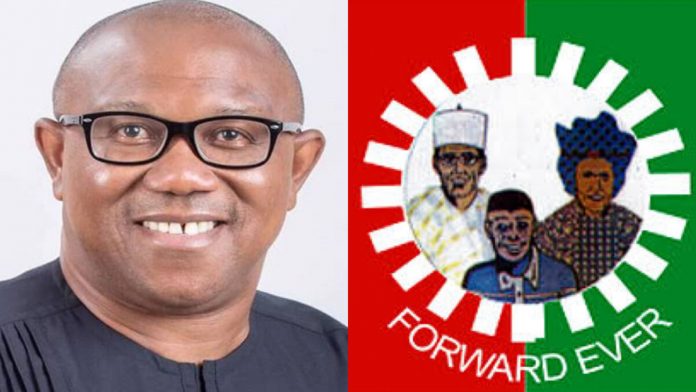Mr Peter Obi, the presidential candidate of the Labour Party, is not a new face in our national politics. He was a two-term governor of Anambra State; he was Atiku Abubakar’s vice-presidential running mate in 2019. He has thus been part of the abracadabra of our national politics at state and federal levels. He has been there and done it.
So, why does his candidature appear to excite the public? Does he represent something exotic in our national politics? Is he a poster child for a fresh face in our national politics? Is he the fresh breath of air in our stultifying politics simply moving in circles and recycling men from one elective office to another?
I do not pretend to have the answers. I have raised them to help raise the tone of one of my pet projects, to wit, the leadership recruitment process that should owe less to ethnicity and religion and more to competence underpinned by antecedents. There must be something going for Obi. His relative youth? Maybe. At 60, Obi is younger than both Atiku Abubakar and Senator Bola Ahmed Tinubu, presidential candidates of PDP and APC respectively. His relative youth counts for something in a field of national politics dominated by older men, all of whom are ex-this, ex-that and ex-everything else who have become permanent features and fixtures in our badly flawed leadership recruitment process.
People are beginning to take the man with the youthful round face seriously too, as witness the young girl who donated all her savings to him; as witness Chief Ayo Adebanjo, who believes that “It is only Peter Obi that can rule independently without the influence of those criminals in the government. Tinubu will only give continuity to Buhari’s incompetence;” as witness the assurance by the spokesman of Arewa Elders Forum, Dr Hakeem Baba-Ahmed, that “Obi will not divide the country if elected;” meaning, I suppose, he will mend the polarisations resulting from the current mismanagement of our diversities.
Obi has demonstrated either courage or naivety in choosing to pursue his presidential ambition on the platform of a relatively unknown political party whose inability to dislodge the behemoths is predictable. Perhaps, that is his attraction for those who have expressed their belief in his capacity to be the president we seek and need even before he has opened his mouth to tell us what he stands for and why we should accept that he has the capacity to do things differently and point our potentially great country towards its true greatness. He chose not to grovel before the mighty men in the two mighty political parties to be given a chance to test himself before the electorate. He chose the lonely road and by doing so, might cut the path towards the possible emergence of the third force in our national politics.
He speaks to those who feel fatigued by the inertia of our national politics given to much motion but relatively little movement. A few days ago, as of this writing, he said: “Pursuant to its statutory responsibility to protect, our government will promote the rule of law, ensure that governance is inclusive, cost-effective, transformative, less transactional; and national investment regenerative.” Heard that before? Obviously. Politics is necessarily eclectic.
It is easy to fall into the trap of romanticising someone who appears to have captured the imagination of not a few people. Perhaps, it is evidence that there is hunger in the land for a new kind of a national leader with the vigour of self-motivation and the broad vision of pan-Nigerianism. Every democratic election raises the hope that a new leader who represents something different from the norm would emerge through the ballot box. A Barack Obama? A Macron?
That is yet to happen in our country. Nigeria is firmly stuck in the mud and the inertia of intellectual stupor. It is a nation of talkers, not of ideas. It needs a new kind of leader sans the baggage of mere political longevity. A third force will expand the people’s options for choosing their leaders at all levels of government. We have been driven to a point where the leaders push their choices in our faces and tell us to take it or leave it. We take it, of course, for our sake.
I have a lot of sympathy for Professor Pat Utomi and other intellectuals who believe that without a third force, we will remain for the foreseeable future stuck with the current leadership recruitment process in which ethnicity and religion play a pretty negative role. We are given to entertaining the motion of leadership recruitment but not its movement. We are stuck with recycled leaders – from the states to the federal and from the federal to the states in an endless recycling of faces that wear new masks at each election season. It is no way to move the nation forward.
Does Peter Obi represent hope in the needed radical changes in our political system to free the energy of Nigerians to pursue their individual dreams strengthened by a new system, if not philosophy, of governance? It is difficult to say. He is of them but appears not to be of them. He has not told us what he intends to do differently to remake our dear country and end its cycle of self-embarrassment in the management of its vast resources. The odds against him are formidable. His intellect may be deep but I do not think his pocket is deep enough to match the war chest of the behemoths. The system is in the firm grip of the eternally recycled men who no longer see anything wrong with the nature of our politics. To dislodge them will take more than robust promises of a better tomorrow in a country impaled on the spike of its own contradictions.
Perhaps there is some hope. It does not take a mob to make radical or fundamental changes in a country. It takes one man with a radically fresh take on how things should be done for the change to happen. Can Peter Obi take up that mantle? That is the challenge of his candidature.



